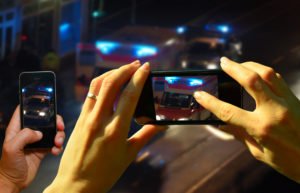
With the increase in publicity related to police misconduct, law enforcement officers often order people to stop taking photographs or video in public places. In some instances, the police even harass, detain or arrest people who use their cameras or cell phone recording devices in public. But is that legal?
On private property, the property owner has the right to make the rules regarding the taking of photographs or videos on his or her property. In that case, if do not follow the property owners’ rules, you can be ordered off the property and arrested for trespassing if you do not comply.
However, in California, as well as every other state in the country, you have the constitutional right to take photographs and videos of things that are plainly visible from public areas where you have a legal right to be present. This includes federal buildings, transportation facilities, as well police and other government officials carrying out their duties. In these circumstances, the police are not entitled to order to cease and desist taking pictures or videos. Nor do the police have the right to demand that you delete your photographs or video.
Generally, the police are not permitted to confiscate or demand to view your photographs or video or search the contents of your cell phone without a warrant. Further, it is possible that courts may approve the seizure of a camera in some circumstances if police have a reasonable, good-faith belief that it contains evidence of a crime by someone other than the police themselves (it is unsettled whether they still need a warrant to view them). (Note: This section has been updated to reflect the June 2014 US Supreme Court decision in Riley v. California, in which the court held that police need a warrant to search a cellphone.)
However, if your activities are truly interfering with legitimate law enforcement operations, the police may order you to stop that behavior. If an officer orders you to stand back, you should comply, since most courts will accept an officer’s judgment about what is considered interference.
Additionally, while you have a right to capture images in public places, you don’t always have a right to record what people say. California’s wiretapping law is a “two-party consent” law. California Penal Code 632 PC makes it a crime to record or eavesdrop on any confidential communication, including a private conversation or telephone call, without the consent of all parties to the conversation. Conversations with police in the course of their duties are not private conversations, but many other things you may record on a public street are. You can record people protesting or giving speeches in public.
If you believe your constitutional rights to photograph or video public police activities has been violated, contact us to discuss your case.

